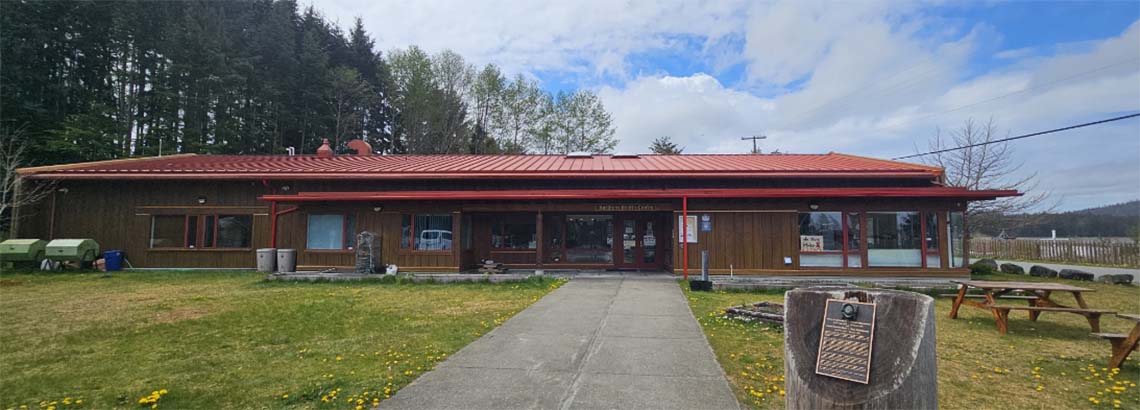Kwakiutl Health Centre

The Health Center operates a fully equipped health facility on the Kwakiutl Band’s Fort Rupert Reserve. Opened in March 2005, the building is centrally located next to the Kwakiutl Big House. In addition to offices for Health staff, there is a fully equipped kitchen for community meals, as well as a lounge area frequently used by Band Elders and other community groups. The Health Centres offers counselling and referral services and has a fully equipped dental surgery that is not yet operational.
For more information about the programs and services of the Health Centre, please contact:
Health Director: hd@kwakiutl.bc.ca
Phone: 250-949-6625
Our Mission
“Wawalla xa hamattala” (Helping Our People)
The KHD mission statement is based on the traditional value and belief that our purpose in life is about “servitude” or “helping our people”. In order for us to fulfill that role, it requires us, individually, to be the best leader that we can be, in order to truly be in the place of “helping our people”. This is the cornerstone or foundation of our way of life the potlatch. The mission statement is further based on the belief that we respect and honour our people and deliver services and programs maintaining the dignity of the people we work with.
Our Vision
“A community living in balance with oneself, one’s neighbor, and all other living things achieving a safe and holistic state of well-being that includes embracing and celebrating the Band’s traditional beliefs and practices. To encourage and nurture a sense of belonging and contribution amongst all members of the Band, while also recognizing a need for ongoing understanding, love, and respect for one another. Building upon the resilience, strengths, family values, and traditional knowledge of our ancestors to guide us in making healthy, positive choices for growth”.
Kwakiutl Band Health Workers
Since April 1, 2013, the Kwakiutl Band Council has taken control of our health services care. The Kwakiutl Health Department, under the administration of the Kwakiutl Band Council, assumed all operational and administrative control for our community’s health services.
We have made tremendous strides with respect to providing primary care and programming that meet the community’s physical, mental, emotional and spiritual health care needs.
Being a community health centre, a strong emphasis is placed on wellness, health promotion and chronic illness prevention throughout the lifecycle (from prenatal to senior citizen programming).
The Health Centre has a team of qualified staff who work as a team implementing the programs and supports necessary for the health and well-being of our community members.
Resource Library
The Resource Library provides parents and staff with books and videos about child development, speech and language development, nutrition and health.
Contact Information
PO Box 2220
97 Tsakis Way
Port Hardy, BC V0N 2P0
Phone: 250-949-6625
Fax: 250-902-2246
Caitlin Hartnett – Health Director (HD)
Cell: 250-230-4532 Ext: 111
Email: hd@kwakiutl.bc.ca
Monday – Friday 8:00am – 4:00pm
Amanda Pyle – Gardener
(250)902-7586 (250) 949-6625 Ext 101
Email: garden@kwakiutl.bc.ca
Monday – Friday 8:00am – 4:00pm
Kim Wilson – Receptionist/Patient Travel Clerk
Ext: 100
Email: pt@kwakiutl.bc.ca
Monday – Friday 8:00am – 4:00pm
Deanna Jewell – Registered Care Aide (RCA)
Ext: 105
Email: rca@kwakiutl.bc.ca
Margaret McDougall – Emergency Project Coordinator(250)949-6625
Ext: 108
Email: emergency@kwakiutl.bc.ca
Monday – Friday 8:00am – 4:00pm
Carol Ford – Head Start
Ext: 109
Email: frhs@kwakiutl.bc.ca
Renee Williams – Community Health Nurse (CHN)
Ext: 102
Email: renee.williams@kwakiutl.bc.ca
Tuesday – Friday 8:15am – 4:00pm
Lisa Greer – Nurse Practitioner
Email: lisa.greer@viha.ca
Robin Hunt – Home and Community Care Nurse (HCC)
Ext: 104
Email: hcn@kwakiutl.bc.ca
Brianna Wilson – Custodian
Email: janitor-health@kwakiutl.bc.ca
Maureen Schat – Addictions & Recovery Worker (ARW)
Email: arw@kwakiutl.bc.ca